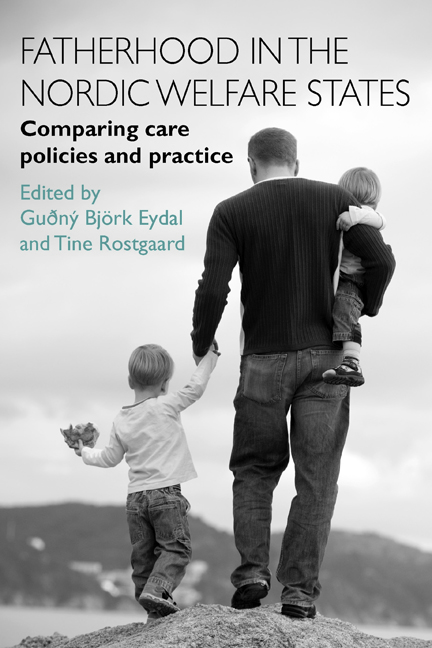Book contents
- Frontmatter
- Contents
- List of tables and figures
- Notes on contributors
- Acknowledgements
- one Introduction
- Theme 1 Fathers, families and family policies
- Theme 2 Fathers in everyday life – culture, work and care
- Theme 3 Constructing fatherhood in different family settings
- Theme 4 Caring fathers and paid parental leave policies
- Theme 5 International reflections on findings
- Conclusions
- Index
nine - Fathering as a learning process: breaking new ground in familiar territory
Published online by Cambridge University Press: 04 March 2022
- Frontmatter
- Contents
- List of tables and figures
- Notes on contributors
- Acknowledgements
- one Introduction
- Theme 1 Fathers, families and family policies
- Theme 2 Fathers in everyday life – culture, work and care
- Theme 3 Constructing fatherhood in different family settings
- Theme 4 Caring fathers and paid parental leave policies
- Theme 5 International reflections on findings
- Conclusions
- Index
Summary
Introduction
This chapter explores the learning processes of fathers engaging in everyday caregiving practices in family life based on a cross-Nordic qualitative study. The fathers were selected because they were seen as ‘pioneers’ in having made unconventional commitments regarding childcare. They had chosen to take longer paternity leave than normal, reduced their working hours or altered their career path so as to be actively involved in the everyday caring for their children. From a historical perspective, their commitments could be seen as avant-garde, and they are possibly the frontrunners of a broad social development.
The notion of ‘modern’ family life is itself an ambiguous term. This chapter departs from an understanding of Western societies as marked by ongoing modernisation and individualisation processes, meaning that contemporary family life unfolds in a context of continual social change (Beck and Beck-Gernsheim, 1995; Dencik et al, 2008; Westerling, 2008). Gillis’ renowned distinction between ‘families we live by’ and ‘families we live with’ (Gillis, 1997, p xv) is also central to the understanding of family and family life that informs the analysis in this chapter. Ideologies and practices are seen as related and connected but cannot be reduced to one or the other; both must be considered, and their relationship cannot be understood in simple or linear terms.
Informed by understandings of social learning and the modernity of critical theory, Olesen (2003) argues that a common disintegration of ‘the normal biography’ is occurring in modernity, requiring new types of social participation and practices – and possibilities for learning. Accordingly, it is possible to understand the involvement of fathers in childcare not merely as ‘chosen’, but also as ‘necessary’, that is, related to the unavoidable, practical arrangements and demands of everyday life.
In this sense, we see these fathers as ‘pioneers’ at the cutting edge of the social change in family life (Roseneil and Budgeon, 2004), challenging traditional, general and conventional forms of fatherhood and constructions of masculinity. In the analytical perspective adopted in this chapter, the fathers emerge as particular men with specific stories about practices and modes of orientation towards care and intimacy in everyday family life.
- Type
- Chapter
- Information
- Fatherhood in the Nordic Welfare StatesComparing Care Policies and Practice, pp. 187 - 208Publisher: Bristol University PressPrint publication year: 2014
- 3
- Cited by



